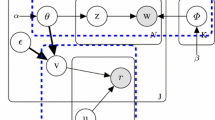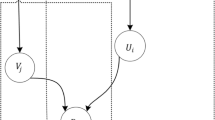Abstract
PLSA which was originally introduced in text analysis area, has been extended to predict user ratings in the collaborative filtering context, known as Triadic PLSA (TPLSA). It is a promising recommender technique but the computational cost is a bottleneck for huge data set. We design a incremental learning scheme for TPLSA for collaborative filtering task that could make forced prediction and free prediction as well. Our incremental implementation is the first of its kind in the probabilistic model based collaborative filtering area, to our best knowledge. Its effectiveness is validated by experiments designed for both rating-based and ranking-based collaborative filtering.
Preview
Unable to display preview. Download preview PDF.
Similar content being viewed by others
References
Hofmann, T.: Unsupervised Learning by Probabilistic Latent Semantic Analysis. Maching Learning Journal 42(1-2), 177–196 (2001)
Monay, F., Gatica-Perez, D.: PLSA-based Image Auto-Annotation: Constraining the Latent Space. In: Proceeding of ACM International Conference on Multimedia, pp. 348–351 (2004)
Papagelis, M., Rousidis, I., Plexousakis, D., et al.: Incremental Collaborative Filtering for Highly-Scalable Recommendation Algorithms. In: Hacid, M.-S., Murray, N.V., Raś, Z.W., Tsumoto, S. (eds.) ISMIS 2005. LNCS (LNAI), vol. 3488, pp. 553–561. Springer, Heidelberg (2005)
Sarwar, B., Karypis, G., Konstan, J., Riedl, J.: Incremental singular value decomposition algorithms for highly scalable recommender systems. In: Proc. Fifth International Conference on Computer and Information Technology, pp. 399–404 (2002)
Bucak, S.S., Gunsel, B., Gursoy, O.: Incremental Non-Negative Matrix Factorization for Dynamic Background Modelling. In: Proceedings of PRIS, pp. 107–116 (2007)
Chou, T.C., Chen, M.C.: Using Incremental PLSA for Threshold Resilient Online Event Anlysis. IEEE TKDE 20(3), 289–299 (2008)
Hofmann, T.: Latent semantic models for collaborative filtering. ACM Trans. Inf. Syst. 22(1), 89–115 (2004)
Zhang, L., Li, C., et al.: An Efficient Solution to Factor Drifting Problem in the PLSA Model. In: Proceedings of the The Fifth International Conference on Computer and Information Technology, pp. 175–181 (2005)
Chien, J.T., Wu, M.S.: Adaptive Bayesian Latent Semantic Analysis. IEEE Transactions on Audio, Speech, and Language Processing 16(1), 198–207 (2008)
Marlin, B.: Collaborative filtering: A machine learning perspective. Master’s thesis, University of Toronto (2004)
Das, A., Datar, M., Garg, A., Rajaram, S.: Google News Personalization: Scalable Online Collaborative Filtering. In: Proc. of the 16th Int. Conf. on World Wide Web, pp. 271–280 (2007)
Herlocker, J.L., Konstan, J.A., Terveen, L.G., Riedl, J.T.: Evaluating Collaborative Filtering Recommender Systems. ACM Trans. Information Systems 22(1), 5–53 (2004)
Wang, J., Robertson, S., De Vries, A.P., Reinders, M.J.T.: Probabilistic relevance ranking for collaborative filtering. Information Retrieval 11(6), 477–497 (2008)
Zhou, T., Ren, J., Medo, M., Zhang, Y.: Bipartite network projection and personal recommendation. Physical Review E 76(4) (2007)
Author information
Authors and Affiliations
Editor information
Editors and Affiliations
Rights and permissions
Copyright information
© 2009 Springer-Verlag Berlin Heidelberg
About this paper
Cite this paper
Wu, H., Wang, Y. (2009). Incremental Learning of Triadic PLSA for Collaborative Filtering. In: Liu, J., Wu, J., Yao, Y., Nishida, T. (eds) Active Media Technology. AMT 2009. Lecture Notes in Computer Science, vol 5820. Springer, Berlin, Heidelberg. https://doi.org/10.1007/978-3-642-04875-3_13
Download citation
DOI: https://doi.org/10.1007/978-3-642-04875-3_13
Publisher Name: Springer, Berlin, Heidelberg
Print ISBN: 978-3-642-04874-6
Online ISBN: 978-3-642-04875-3
eBook Packages: Computer ScienceComputer Science (R0)




